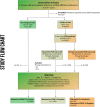COVID-19 increases the risk for the onset of atrial fibrillation in hospitalized patients
- PMID: 35835807
- PMCID: PMC9281233
- DOI: 10.1038/s41598-022-16113-6
COVID-19 increases the risk for the onset of atrial fibrillation in hospitalized patients
Abstract
COVID-19 is associated with significant extrapulmonary symptoms. Myocardial involvement has been described for infections with SARS-CoV-2 which may lead to an increase in morbidity and mortality. The objective of our study was to investigate the association of COVID-19 and atrial fibrillation (AF) or atrial flutter (AFl) in hospitalized patients. This retrospective study used electronic medical records to detect patients with COVID-19 and their comorbidities within the Mass General Brigham hospital system. All patients ≥ 18 years who were hospitalized and received a PCR test for SARS-CoV-2 were screened for inclusion as well as patients from a pre-pandemic cohort. We matched on common risk factors for AF and then used multivariable logistic regression to estimate the odds for AF or AFl. Of 78,725 patients eligible for analysis, 11,004 COVID-19 negative patients were matched to 3,090 COVID-19 positive patients and 5005 pre-pandemic patients were matched to 2283 COVID-19 positive patients. After adjusting for demographics and comorbidities, COVID-19 positive patients had 1.19 times the odds (95% CI 1.00, 1.41) of developing AF compared to COVID-19 negative patients and 1.57 times the odds (95% CI 1.23, 2.00) of developing AF compared to pre-pandemic patients. Our study demonstrated an increased risk for AF, directing the attention for improved screening and treatment regimens for the sequelae of COVID-19. While COVID-19 continues to affect many people around the world, AF may be a significant cause for morbidity and mortality. Adequate detection and treatment of AF is essential to reduce the burden of disease.
© 2022. The Author(s).
Conflict of interest statement
The authors declare no competing interests.
Figures



References
Publication types
MeSH terms
Grants and funding
LinkOut - more resources
Full Text Sources
Medical
Miscellaneous

